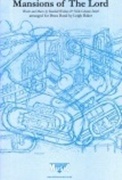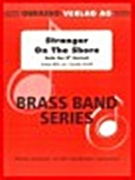Results
-
 £35.00
£35.00MANSIONS OF THE LORD (Brass Band) - Baker, Leigh
From the film: We Were Soldiers.
Estimated dispatch 7-14 working days
-
 £32.95
£32.95MARCH OF THE BOWMEN (Brass Band) - Curzon, Frederic - Wright, Denis
from: The Robin Hood Suite
Estimated dispatch 7-14 working days
-
 £38.80
£38.80MARCH OF THE PRIESTS (from the ''Magic Flute'') (Brass Band) - Mozart, Wolfgang Amadeus - Smith, Sandy
Medium
Estimated dispatch 7-14 working days
-
 £54.20
£54.20MARCH OF THE TOYS (Brass Band) - Herbert, Victor - Freeh, Mark
From the 1903 Broadway Operetta, Babes In Toyland. Grade: Easy/Medium.
Estimated dispatch 7-14 working days
-
 £50.90
£50.90MUNSTERS, The (Brass Band featuring Euphonium and Basses) - Marshall, Jack - Ratnik, Peter
Main Theme from the 1960's US TV Series. Grade: Easy.
Estimated dispatch 7-14 working days
-
 £65.00
£65.00RISE OF THE PHOENIX (Brass Band - Score and Parts) - Barry, Darrol
As the title suggests, the phoenix was a fabulous mythical bird, who every morning at dawn, sang a song so enchanting that even the sun God, Apollo, would stop and listen. The bird would live for a hundred years, and at the end of its life, would build a pyre, set it on fire and be consumed by the flames. After three days, the phoenix would be reborn from the ashes, to sing once more.This work was commissioned by Clifton and Lightcliffe Band and reflects the difficulties and rebirth of the band to make music once more.Suitable for second section bands and above.
Estimated dispatch 7-14 working days
-
 £27.50
£27.50RISE OF THE PHOENIX (Brass Band - Score only) - Barry, Darrol
As the title suggests, the phoenix was a fabulous mythical bird, who every morning at dawn, sang a song so enchanting that even the sun God, Apollo, would stop and listen. The bird would live for a hundred years, and at the end of its life, would build a pyre, set it on fire and be consumed by the flames. After three days, the phoenix would be reborn from the ashes, to sing once more.This work was commissioned by Clifton and Lightcliffe Band and reflects the difficulties and rebirth of the band to make music once more.Suitable for second section bands and above.
Estimated dispatch 7-14 working days
-
 £54.20
£54.20SAND VOLCANO, THE (Brass Band) - Goldsmith, Jerry - Richards, Goff
from The Mummy. Grade: Medium. Duration: 4:30
Estimated dispatch 7-14 working days
-
 £50.90
£50.90SEVENTH VOYAGE OF SINDBAD, The (Brass Band) - Herrmann, Bernard - Barry, Darrol
Main Theme from the film. Grade: Easy/Medium.
Estimated dispatch 7-14 working days
-
 £50.90
£50.90STRANGER ON THE SHORE (Soprano Cornet/Brass Band) - Bilk, Acker - Smith, Sandy
Soprano Cornet & Brass Band. Acker Bilk's hit from the 1960's.
Estimated dispatch 7-14 working days
